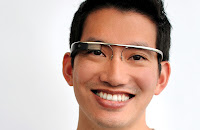Google recently unveiled Google Glasses for beta testing (see the news story here), bringing up a number of questions regarding the future of privacy.
In the pre-digital age (before the Internet, social media and mobiquity (ubiquitous use of mobile technology)), a sign of one’s wealth and power was demonstrated as public fame. Although we are still riding the crest of this wave, it is beginning to break on the shores of the present. As that wave breaks on the present’s shore, it will begin to pull back into the ocean of history, reversing direction and changing culture’s landscape in the process. One of the many impacts of the retreating waves of history is the reversal of public and private. As the crest retreats, privacy will become a sign of wealth and power rather than public fame.
The controversy and conversation that Google Glass is creating highlights this shift. The future of technology will, increasingly, compress everything into the public sphere with accumulative complications. Google Glass is the latest manifestation of this increasing reality, conjuring several privacy related questions:
- Where is it appropriate for the average person to film and publicly broadcast, and where is it not?
- What is private and what is public?
- Are private and public distinctions an increasingly archaic and obsolete distinction in an emerging digital society?
It is an interesting observation that although the general populace is, typically, infuriated by the government’s video surveillance, they are largely ignorant of the pervasive cameras in their possession, sharing videos, pictures, audio and text that are filtered through private companies’ servers (this information is then sold to the highest bidder – remember with free services (Gmail, Instagram, Google, Facebook, Twitter, etc.), you are the product being consumed). Consequently, we have moved away from cities with thousands of cameras (owned, operated and regulated by governments and corporations) to cities with millions of cameras (owned and maintained by individuals, filtered through private companies’ servers, with little to no regulation).
In our emerging world of DUB (this is an acronym for my phrase “Democratized Ubiquitous Broadcasting”), will privacy, rather than public fame, be the new sign of wealth and power? Will wealth be shown through the ability to hide? Will wealth create privacy behind virtual digital fences the way it does with physical mansions and estates? Will a sign of wealth be anonymity, in a way the vast majority of the populace can’t experience?
I am, intentionally, posing questions rather than answers. As we enter the digital future, in mobiquitous fashion, we need to be asking these questions – recognizing the ubiquitous effects of social media and Internet technology.


